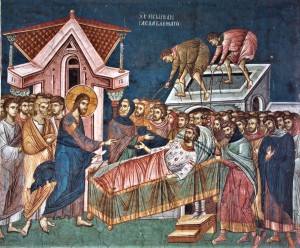Sunday of Saint Gregory Palamas – Metropolitan Nahum of Strumica
Refer: Mark 2, 1-10
Often, man is so incapable of movement, i.e. paralysed by the sin, which he, himself is unable to approach Christ and request healing. In such situations, the great and irreplaceable importance of the Church as a community comes into the picture, which with Its various Divinely-human gifts such as: consolation, teaching, personal example, material help, repentance, etc., and regardless of the difficulties, brings man to the Lord Christ – The Healer of our souls and bodies. On the part of the “paralytic”, humility only is required”.
We can also see such united struggle in the effort to bring the paralytic to the God-Man Christ. But, we can also see humility. Entering through the roof of the house with the hope of healing, and instead, he publicly heard only the cause of his illness – sin, and accepting it all without thought or objection, is not this a testimony of humility?
Yes, the behaviour of the paralytic shows that he has realised what is the cause of his illness, and that is sin, as Christ confirmed, and he silently, humbly and gratefully accepts the Lord’s decision, considering himself unworthy even for that much – forgiveness of his sins “only”.
Accepting God’s word for us, accepting God’s will for us and accepting God’s providence for us, in our involuntary suffering, with humility and gratitude, means at the same time our opening for God and our acceptance of God’s grace. Consequently, it means our healing, both mentally and physically. The sequence of events shows that this is exactly what it is about.
The Lord God is the only One who has the power to forgive sins if we approach Him with faith and repentance, that is, with humility and gratitude. True repentance and true forgiveness of sins is perceptible (recognisable) by the non-repetition of the sin. Forgiveness of a sin also means healing from the consequences of the sin, and that is the restoration of our communion with God.
That is why the Lord Jesus Christ addresses the paralytic in a fatherly manner, with the word “son” …
That very moment, the forgiveness of sins, is the reason for the thoughts of the scribes. They know from the Books of the Law that only God has the power to forgive sins. Therefore, they might not have thought of anything if Christ had only healed the paralytic, because, that would have been just another of the many cases that He was doing at that time; but the proclamation of forgiveness of sins confuses them.
Especially, for their conversion and salvation, Christ acts in the order in which events follow: firstly, He publicly forgives the paralytic, then lovingly – without rebuking them, as He knows, when He sees repentance – He reveals the thoughts of their hearts, and in the end He manifests to them the power and authority of God – which as God, He has, with the healing of the paralytic. This is confirmed by the gospel itself: “so that all [without exception] were amazed and glorified God, saying, ‘We have never seen such a miracle!'” (Mark 2, 12)
Spiritual development, as a voluntary act (struggle, effort) – according to the Hesychastic Fathers of the Church, is a conscious purification of the heart from the passions up to the moment of the manifestation of the grace of Baptism from it, i.e. up to the moment of the opening of the heart for the prayer of the mind in the heart and the first viewing of the uncreated light. It is true liberation from the slavery to the passions, from the sin, the demon, and the death; it is a transition from the unnatural to the natural way of life, it is the non-belonging to this world and the adoption by God.
The theology of the ascetic-hesychastic struggle is most fully explained in the works of our Holy Father Gregory Palamas, to whom the Church dedicated the second Sunday of the Great Lent.
Most-Holy Theotokos, through the prayers of Saint Gregory Palamas, save us!
Metropolitan Nahum of Strumica
(27.03.2021 16:54)

